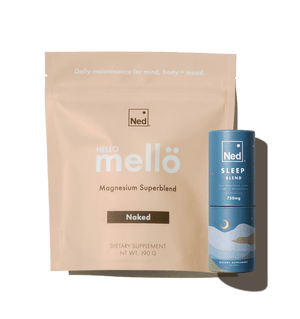ARE YOU MAGNESIUM DEFICIENT?
Exercise, stress, heavy thinking, launching immune defenses, and drinking alcohol all use up extra magnesium and should be accounted for in one’s daily intake.
Do Men Benefit from Magnesium Supplements?
Testosterone | Immunity | Energy | DNA | Muscles | Best Magnesium for Men
The health benefits of magnesium for men include over 600 different cellular reactions that enable cell life and all biological processes including testosterone production, immune response, energy production, DNA repair, and muscle movement [1].
Critical to cell survival and toxin cleanup, Magnesium is the fourth most abundant essential mineral in a man's body. Unfortunately, research suggests that about 75% of Americans are not consuming enough of it [2].
The National Institute of Health recommends that men consume 400-420 mg of magnesium per day.
However, available metabolic data shows that intakes below 6 mg per kg per day (i.e. below 408 mg per day for a 150 lb man) will likely result in a negative magnesium balance.
Therefore, researchers recommend that men consume at least 7 to 10 mg per kg of magnesium daily to meet the demands of their bodies [3]. For a 150 lb man, that's about 680 mg per day.
Exercise, stress, heavy thinking, launching immune defenses, and drinking alcohol all use up extra magnesium and should be accounted for in one’s daily intake.
In fact, evidence indicates that alcohol is one of the main causes of magnesium loss from several tissues, increasing urinary magnesium excretion by 2-3 fold [4].
Read on to learn 5 important benefits of magnesium for men and find out why mellö Magnesium Superblend is the best supplement for supporting men’s health.
mellö Magnesium
30 serving pouch
Magnesium plays a role in over 300 essential functions in the body, including helping to maintain healthy energy levels, muscle function, and a balanced mood. mellö Magnesium Superblend® is a thoughtfully crafted formula made to support your daily wellness routine.
60-day Stress Free Guarantee
Simply place your order. Your 60-day trial begins from the day your order is delivered.
Start using your Ned product. Our Customer Happiness Team is here to give you all the guidance you need.
If you want to break things off, no hard feelings. Contact our Customer Happiness Team and they’ll help you out. Simple.
**Valid for one product at a time - bundles not eligible
1. Magnesium Enables Testosterone Synthesis
Evidence suggests that magnesium has a positive effect on anabolic hormonal status, including testosterone, in men [5]. This is because many of the steps that go into testosterone production require magnesium ions to take place.
A 2011 study showed that men who supplemented with 10 mg per kg of magnesium daily for four weeks experienced significant increases in both free and total testosterone levels, with the group who exercised for 90-120 minutes five days a week showing the greatest increases [6].
Free testosterone, which accounts for less than 4% of total testosterone in the body, is responsible for a man’s sexual traits.
Approximately two-thirds of the remaining 96-plus percent of the body’s testosterone is bound to sex hormone-binding globulin (SHBG) while the final third is attached to the protein albumin.
2. Magnesium Enables Immune Response
Magnesium plays a critical role in healthy immune responses and magnesium deficiency is associated with impaired immunity [7]. The production, release, and activity of immune system cells are all magnesium-dependent functions.
Magnesium is needed to produce antibodies known as immunoglobulins, which are made in response to specific invaders, such as viruses or bacteria. These invaders, known as antigens have unique binding sites through which they can interact with and harm healthy cells.
In order to neutralize the harmful antigens, a man’s body produces antibodies that fit and attach to the unique binding sites found on each invader.
By attaching themselves to particles that need to be eliminated, antibodies occupy invader binding sites that would otherwise be used to interact with and damage healthy cells.
Due to the uniqueness of binding sites, an antibody made for the flu virus cannot fit into the binding site of a covid virus protein, so adequate magnesium is required to manufacture the various antibodies needed for the many antigen invaders a man encounters on a daily basis.
Magnesium is also needed for the killing of these foreign invaders to which the antibodies have attached themselves. This process is known as antibody-dependent cytolysis.
Other immune processes which require magnesium include the production of C’3 convertase, immune cell adherence, macrophage response to lymphokines, lgM lymphocyte binding, and T helper-B cell adherence [8].
3. Magnesium Enables Energy Production
Magnesium activates energy-producing enzymes that convert inputs such as glucose sugars into smaller molecules. These smaller molecules, known as adenosine triphosphate, or ATP, are the body’s basic form of cellular energy and are responsible for storing and shuttling energy.
Every cell makes and uses ATP and when it wants to carry out a function such as division or moving molecules across cell membranes it uses ATP bound to a magnesium ion. ATP breaks down into adenosine diphosphate (ADP) when it is used.
ADP is recycled back into the cell’s mitochondria, where it is transformed back into ATP through a magnesium-dependent process. An average ATP molecule in a man’s body undergoes this process thousands of times daily, requiring a constant stream of magnesium to generate and recharge energy [9].
4. Magnesium Enables DNA Synthesis and Repair
Magnesium activates an enzyme known as DNA polymerase, which has two magnesium sites and cannot work without magnesium [10]. DNA polymerase is responsible for repairing and replicating DNA strands.
Every day a man’s body plays host to hundreds of billions of cell divisions. In each division, the cell copies an identical set of DNA strands, a process made possible by magnesium bound DNA polymerase, which is generally pretty accurate at copying DNA.
However, mistakes in DNA sequencing do happen and DNA damage can occur as a result of viruses, radiation, temperature changes, reactive toxic chemicals, and other harmful triggers. In order to identify mistakes and repair broken DNA our bodies produce magnesium-dependent enzymes to cut away the damaged DNA parts and replace them with new nucleotides [11].
5. Magnesium Enables Muscle Growth and Relaxation
Magnesium enables the linking together of amino acids to make the proteins that muscles are made of [12]. Not only does magnesium act as a cofactor, or activator, for most of the enzymes that enable protein synthesis, but it is also required for the proper function of ribosomes, which are the sites in a cell where protein synthesis takes place [13].
Magnesium is also an antidote to muscle contractions and resulting spasms or cramps. Whereas calcium, which is excitatory in the body, generates muscle contractions, magnesium, which is inhibitory, relaxes contractions. In a relaxed muscle, the calcium/magnesium binding sites are saturated with magnesium [14].
When magnesium attaches to and blocks calcium channels at muscle cell receptor sites that bind both calcium and magnesium it counteracts calcium’s excitatory effects. When there isn’t enough magnesium available to compete with calcium, muscles cannot relax leading to excessive tightness, spasms, or cramps.
Why mellö is the Best Magnesium Supplement for Men
Magnesium is essential to cell life, but not all magnesium supplements are created equal. mellö is specially formulated for whole-body absorption with a proprietary superblend of three highly bioavailable forms of chelated magnesium: Aquamin magnesium citrate, magnesium lactate gluconate, and Magtein magnesium L-threonate, plus amino acids L-theanine, GABA, and over 70 trace minerals.
Try mellö today to propel your cognitive function, healthy hormone production, muscle health, memory, mood, immunity, sleep, increased energy, nerve and muscle health, and every other process in your body.
References
- De Baaij, J. H., Hoenderop, J. G., & Bindels, R. J. (2015). Magnesium in man: implications for health and disease. Physiological reviews.
- Bailey, R. L., Dodd, K. W., Goldman, J. A., Gahche, J. J., Dwyer, J. T., Moshfegh, A. J., ... & Picciano, M. F. (2010). Estimation of total usual calcium and vitamin D intakes in the United States. The Journal of nutrition, 140(4), 817-822.
- Seelig, M. S. (1964). The requirement of magnesium by the normal adult: summary and analysis of published data. The American journal of clinical nutrition, 14(6), 342-390.
- Romani, A. M. (2008). Magnesium homeostasis and alcohol consumption. Magnesium research, 21(4), 197-204.
- Maggio, M., De Vita, F., Lauretani, F., Nouvenne, A., Meschi, T., Ticinesi, A., ... & Ceda, G. P. (2014). The interplay between magnesium and testosterone in modulating physical function in men. International journal of endocrinology, 2014.
- Cinar, V., Polat, Y., Baltaci, A. K., & Mogulkoc, R. (2011). Effects of magnesium supplementation on testosterone levels of athletes and sedentary subjects at rest and after exhaustion. Biological trace element research, 140(1), 18-23.
- Kubenam, K. S. (1994). The role of magnesium in immunity. Journal of Nutritional Immunology, 2(3), 107-126.
- Galland, L. (1988). Magnesium and immune function: an overview. Magnesium, 7(5-6), 290-299.
- Apell, H. J., Hitzler, T., & Schreiber, G. (2017). Modulation of the Na, K-ATPase by magnesium ions. Biochemistry, 56(7), 1005-1016.
- Yang, L., Arora, K., Beard, W. A., Wilson, S. H., & Schlick, T. (2004). Critical role of magnesium ions in DNA polymerase β's closing and active site assembly. Journal of the american chemical society, 126(27), 8441-8453.
- Hartwig, A. (2001). Role of magnesium in genomic stability. Mutation Research/Fundamental and Molecular Mechanisms of Mutagenesis, 475(1-2), 113-121.
- Flowers, T. J., & Dalmond, D. (1992). Protein synthesis in halophytes: the influence of potassium, sodium and magnesium in vitro. Plant and Soil, 146(1), 153-161.
- Rozov, A., Khusainov, I., El Omari, K., Duman, R., Mykhaylyk, V., Yusupov, M., ... & Yusupova, G. (2019). Importance of potassium ions for ribosome structure and function revealed by long-wavelength X-ray diffraction. Nature communications, 10(1), 1-12.
- Potter, J. D., Robertson, S. P., & Johnson, J. D. (1981, October). Magnesium and the regulation of muscle contraction. In Federation proceedings (Vol. 40, No. 12, pp. 2653-2656).
mellö Magnesium
30 serving pouch
Magnesium plays a role in over 300 essential functions in the body, including helping to maintain healthy energy levels, muscle function, and a balanced mood. mellö Magnesium Superblend® is a thoughtfully crafted formula made to support your daily wellness routine.
60-day Stress Free Guarantee
Simply place your order. Your 60-day trial begins from the day your order is delivered.
Start using your Ned product. Our Customer Happiness Team is here to give you all the guidance you need.
If you want to break things off, no hard feelings. Contact our Customer Happiness Team and they’ll help you out. Simple.
**Valid for one product at a time - bundles not eligible
Shuteye Chai - mellö Sleep Latte
30 serving pouch
60-day Stress Free Guarantee
Simply place your order. Your 60-day trial begins from the day your order is delivered.
Start using your Ned product. Our Customer Happiness Team is here to give you all the guidance you need.
If you want to break things off, no hard feelings. Contact our Customer Happiness Team and they’ll help you out. Simple.
**Valid for one product at a time - bundles not eligible
The Dream Set
This bundle is literally the Ned dream team! Mellö promotes calm and relaxation to help you fall asleep faster, while Sleep Blend reduces sleep disturbances to help you sleep deeper and longer.
Why it's special:
Two of our best-selling products to help you put sleep problems to rest, once and for all! Mellö promotes calm for a good night’s sleep. Sleep Blend helps you sleep deeper and longer. Limited time offer: subscribe to The Dream Set and we'll add a free gift plus free shipping.
60-day Stress Free Guarantee
Simply place your order. Your 60-day trial begins from the day your order is delivered.
Start using your Ned product. Our Customer Happiness Team is here to give you all the guidance you need.
If you want to break things off, no hard feelings. Contact our Customer Happiness Team and they’ll help you out. Simple.
**Valid for one product at a time - bundles not eligible








